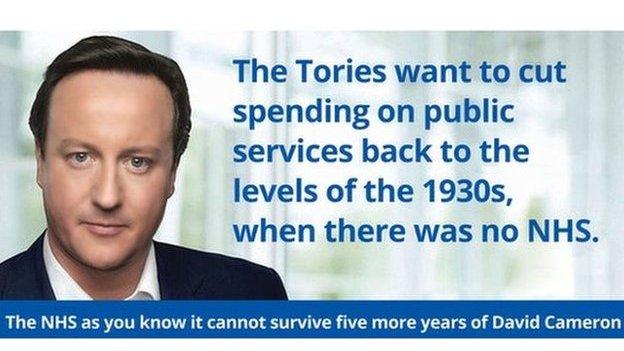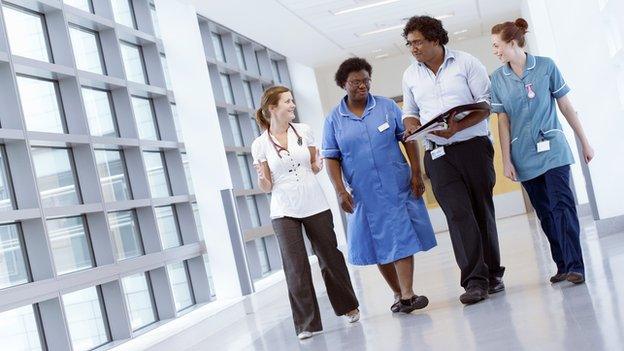NHS set for a bumpy start to 2015
- Published

The new year has barely started and the focus is once again shifting to how the NHS is performing.
Reports over the weekend suggested that Labour is set to make the health service a key election battleground should come as no surprise - nor should the timing.
Figures will be published this week that are expected to show performance in A&E units in England has dropped to its worst level since the four-hour waiting time target was introduced a decade ago.
The data released on Tuesday will measure the October to December quarter, but from the weekly statistics covering all but the last two weeks of the period we already know that performance has been consistently below the target level.
Even a remarkable turnaround over the festive period would be unlikely to save the government's blushes.
Labour is bound to jump on the figures as a sign that the NHS is suffering under the coalition, which will no doubt prompt ministers to compare performance with Labour-controlled Wales where waiting times are even worse.
Election campaign
Nigel Edwards, chief executive of the Nuffield Trust think-tank, says it is inevitable the NHS will remain in the headlines from now on as the "cracks are showing".
But he says it could get even worse if illnesses such as flu and norovirus take hold. "The immediate risk is that there will be some spectacular collapses in local healthcare systems."

Labour has launched a poster campaign, mimicking the Tories' 2010 adverts

Meanwhile, the Conservatives' first campaign poster focused on the economy
Of course, these are not the headlines Tory MPs expected to be defending on the doorsteps in 2015 when they fought the last election on a flagship promise to protect the health service.
But that is the reality. For the past two years Labour has been talking about the NHS being the Tories' weak spot following controversial reforms instigated by David Cameron's first Health Secretary Andrew Lansley.
In fact, some commentators believe, after the economy, the NHS could be the most important issue in the election campaign.
After all, in the lead up to Christmas, the three main political parties were battling it out to see who could sound more generous in their promises of extra money for the NHS.
But experts are still sceptical about the impact these will have. King's Fund chief economist Prof John Appleby says while the pledges are welcome "none of them have yet addressed the scale of the financial challenge".
Questions asked
He predicts whoever forms the next government will "inherit a service under huge pressure".
But where else will the focus be apart from A&E and money?
Later in the month figures for routine hospital operations, such as knee and hip replacements, will be published.
The 18-week target has been missed for the past five months as hospitals have been given permission for a "managed breach" in a bid to reduce the backlog of long waiters (the focus has been on those waiting over six months).
However, ministers promised performance would return to normal by the end of 2014. If the figures show the target is not being met (and word in the health service is that it is proving a struggle) questions will start being asked.

The 62-day target for cancer treatment is also been missed. If the latest quarter - to be published in February - follows suit that will make it a full year without it being achieved.
Balancing the books is also proving problematic. At the 2014-15 half-year point the NHS in England was already £630m in the red. By the election provisional year-end data will be available.
So too will new data from the GP patient survey, external. The last tranche of information published in the summer showed seeing a GP was getting more difficult.
Labour has already signalled its intention to focus on this by promising to bring back the 48-hour target to get a GP appointment, which was abolished by the coalition in the early days of this parliament.
But also expect to see a battle over council-run social care. The government will soon be championing its reforms to elderly care - legislation is expected to be published in the coming weeks paving the way for the introduction of a cap on costs.
This is being set at £72,000 from 2016 for everything from help at home for tasks such as washing and dressing to a place in a care home.
Ministers have championed it as a way of protecting people from "catastrophic costs" which can lead to people selling their homes to pay for care.

But the reform does not bring extra money into the system and with the numbers getting help falling by more than a quarter in the past five years the Local Government Association is already leading a vociferous campaign to get more money.
That is not to say the Tories - and Lib Dems for that matter - won't meet Labour head on. Both believe they have a good story to tell about how patient safety has been improved following the Stafford Hospital scandal.
A public inquiry has been held and its findings published, external in February 2013 - since when there has been a rise in the number of nurses on wards and greater transparency through the publication of a host of indicators, including staffing levels.
Health Secretary Jeremy Hunt for one never tires of reminding his opposite number on the Labour benches, Andy Burnham, that the scandal happened on his watch (he served as health secretary and a health minister during Labour's years in power).
He has also been quick to compare performance in England to that in Wales, which under Labour, he says, provides a "second class" service.
It just all goes to show that with pressures growing in the NHS, the next few months are likely to see the health of the health service pored over more than ever.